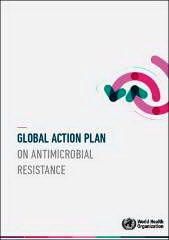 Global Action Plan on Antimicrobial Resistance (2015)Antimicrobial resistance (AMR) is a serious public health problem worldwide. It threatens the very core of modern medicine and the sustainability of an effective, global public health response to the enduring threat from infectious diseases. Systematic misuse and overuse of these drugs in human medicine and food production have put every nation at risk. Few replacement products are in the pipeline. Without harmonized and immediate action on a global scale, the world is heading towards a post-antibiotic era in which common infections could once again kill.
Global Action Plan on Antimicrobial Resistance (2015)Antimicrobial resistance (AMR) is a serious public health problem worldwide. It threatens the very core of modern medicine and the sustainability of an effective, global public health response to the enduring threat from infectious diseases. Systematic misuse and overuse of these drugs in human medicine and food production have put every nation at risk. Few replacement products are in the pipeline. Without harmonized and immediate action on a global scale, the world is heading towards a post-antibiotic era in which common infections could once again kill.
The "Global Action Plan" to tackle the growing problem of resistance to antibiotics and other antimicrobial medicines was endorsed by the World Health Assembly in May 2015 in resolution WHA67.25. The goal of the plan is to ensure continuity of successful treatment and prevention of infectious diseases with effective and safe medicines that are quality assured, used in a responsible way and accessible to all who need them.
The 5 objectives outlined in the "Global Action Plan" are to:
improve awareness and understanding of antimicrobial resistance
strengthen knowledge through surveillance and research
reduce the incidence of infection
optimize the use of antimicrobial agents
ensure sustainable investment in countering antimicrobial resistance.
The "Global Action Plan" provides a framework for developing national action plans, including key actions that the various actors should take within 5–10 years to combat AMR.
Related links
Global Action Plan on Antimicrobial Resistance (2015)
Food and Agriculture Organization of the United Nations
World Organisation for Animal Health


